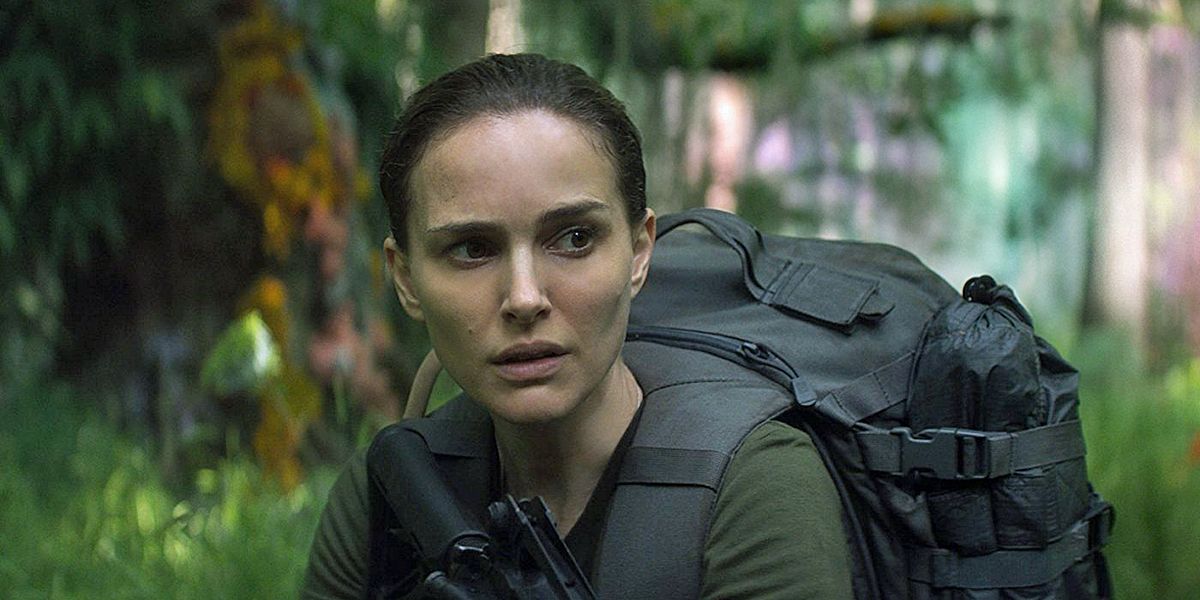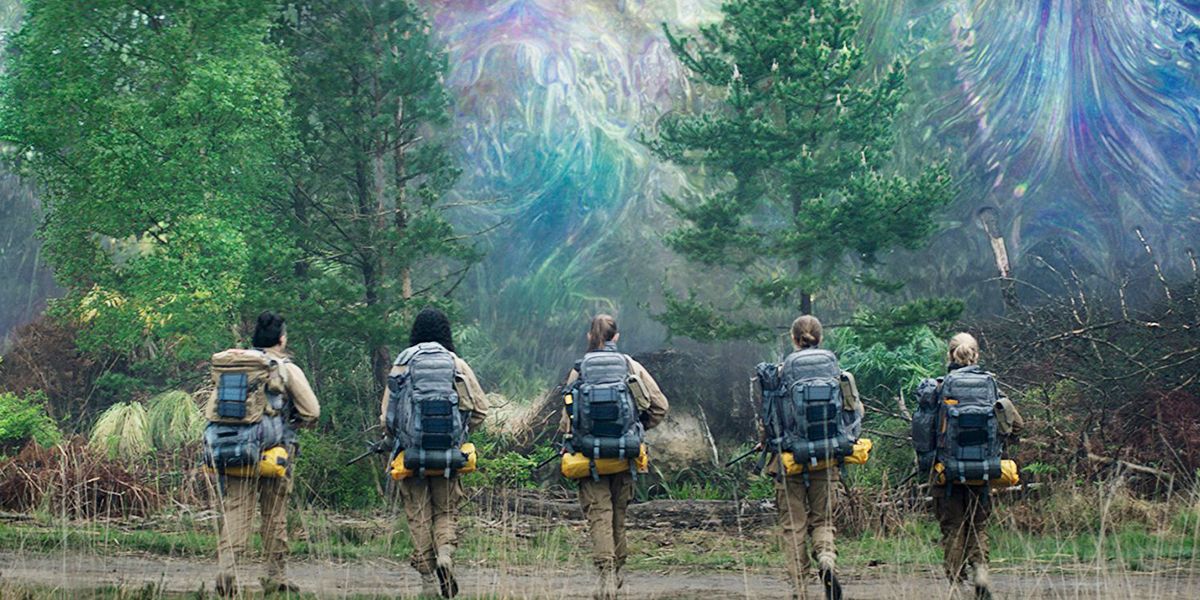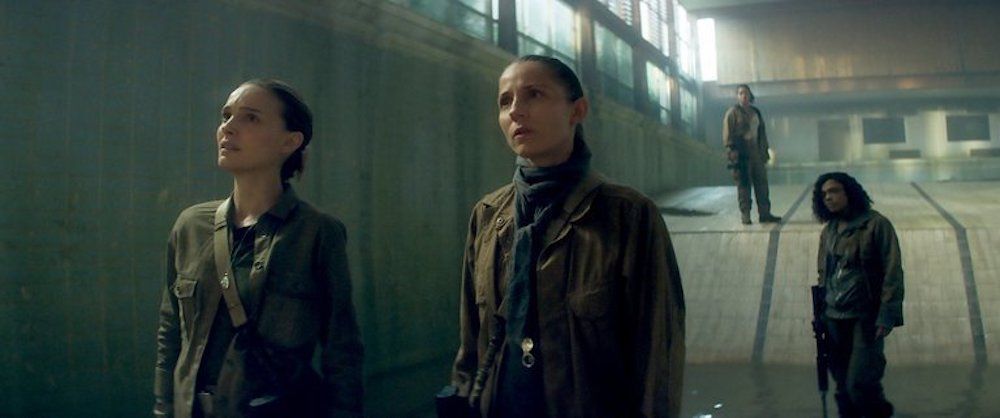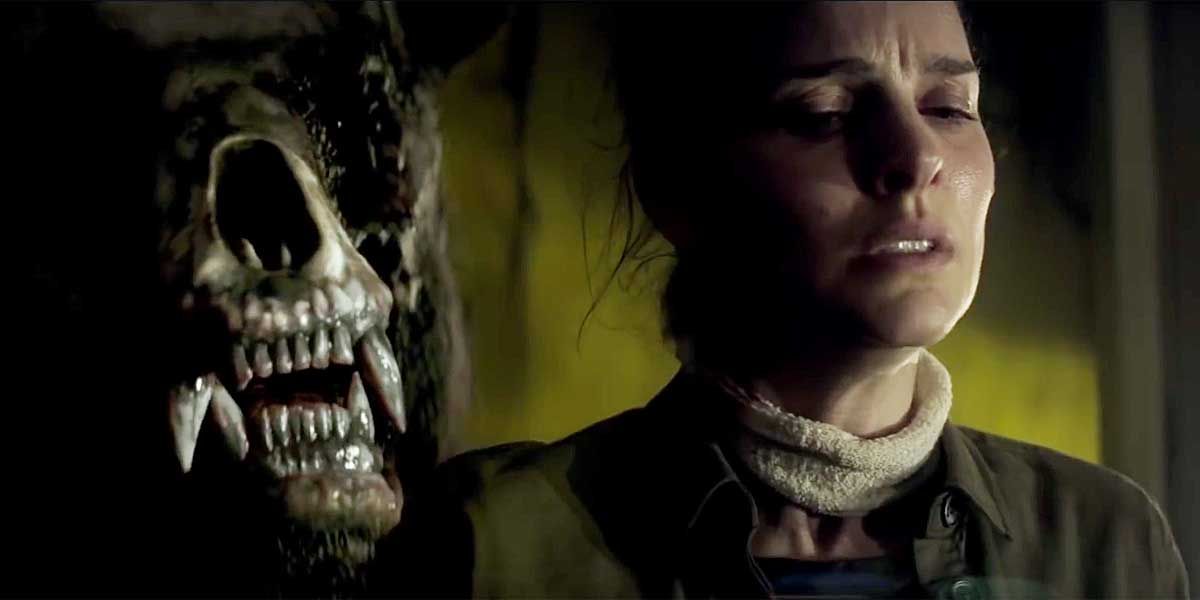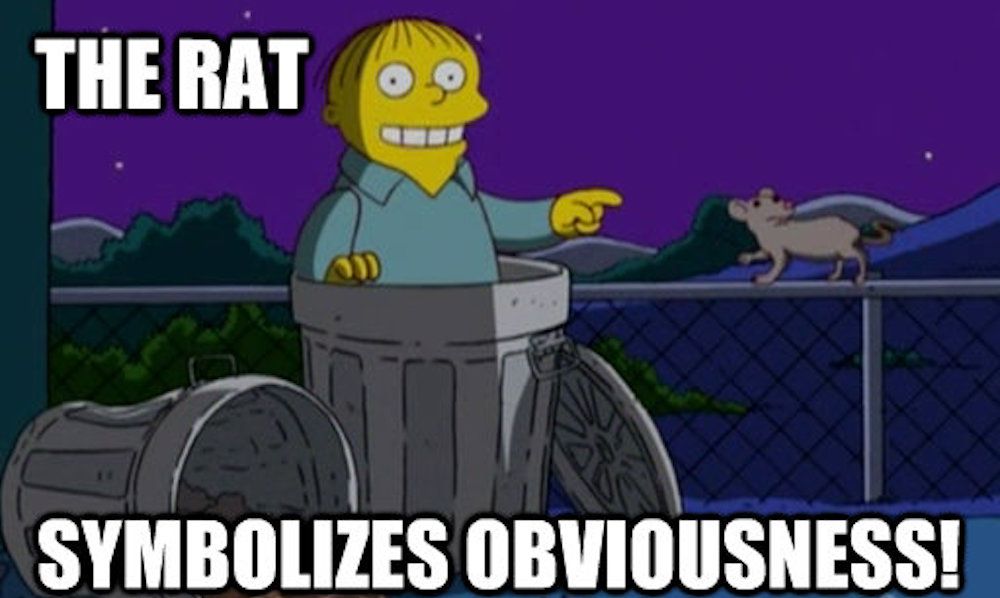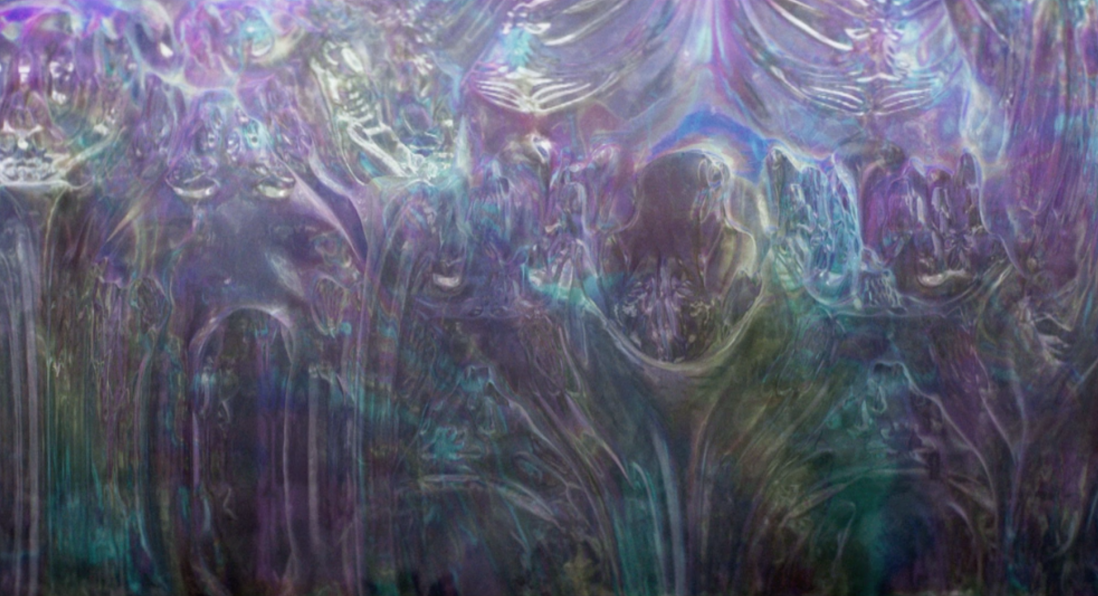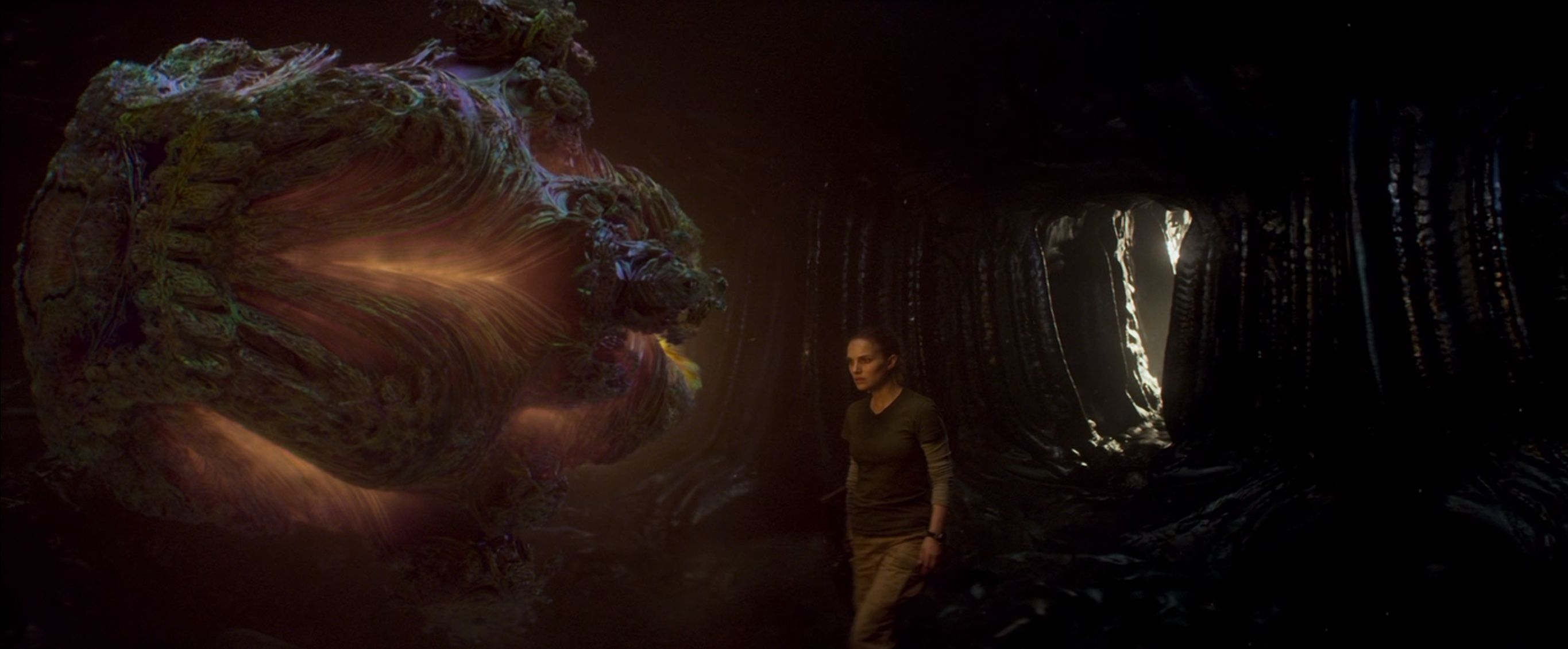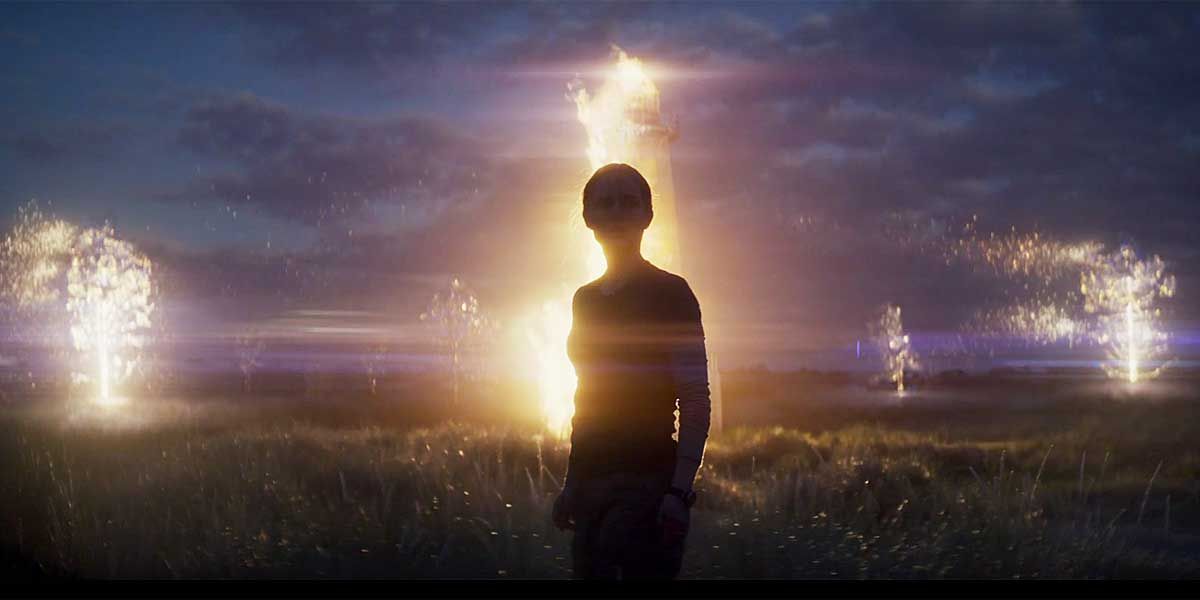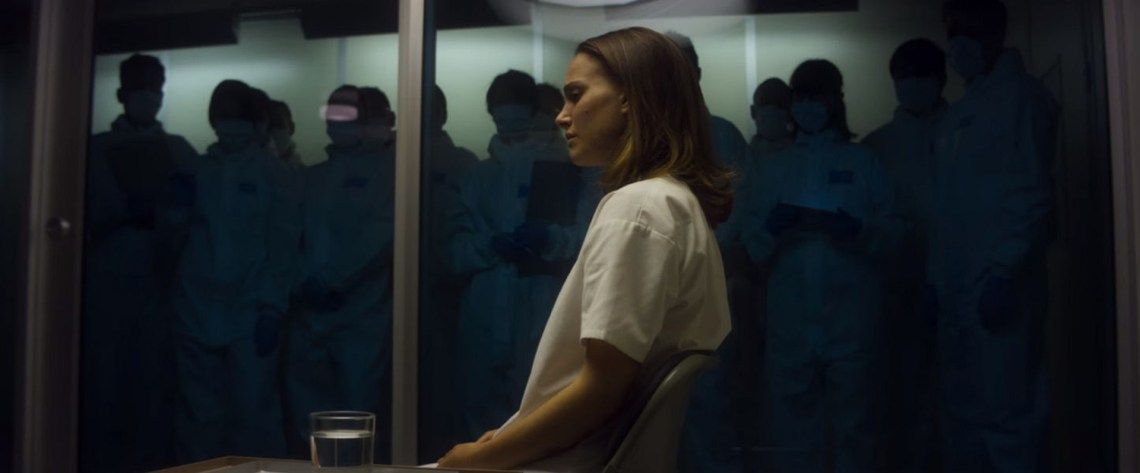Annihilation is the sort of serious science fiction film that impresses critics and confuses the hell out of everyone else. Both reactions make perfect sense. It's a very good movie and it's also utterly bizarre. Alex Garland's follow-up to Ex Machina finds itself halfway between a traditional sci-fi thriller and pure experimental arthouse abstraction. Test audiences didn't get it and Paramount freaked out, trying to take final cut away from Garland. The director's cut ultimately won out and that's what playing now in theaters in North America and China. Internationally, however, Paramount sold off the film to Netflix, similar to how they handled The Cloverfield Paradox (though thankfully it's much better than that movie).
While Ex Machina might possibly be this decade's best sci-fi movie, Annihilation is more ambitious, but also more flawed than its predecessor. A few notable weaknesses hold it back from greatness. Yet it's also the exact sort of movie custom made to acquire a cult following, which fans will be discussing and debating for a long time. This list will go over 10 reasons Annihilation is destined for future cult classic status, as well as five problems holding it back from being a regular classic.
SPOILERS AHEAD!
15 PRO: PAYS HOMAGE TO THE CLASSICS
If you're a fan of classic science fiction, you'll be impressed with the wide pool of influences behind Annihilation. The reference points range from the visceral intensity of John Carpenter's The Thing to the blockbuster surrealism of 2001: A Space Odyssey. The most significant influence, less widely known, is Andrei Tarkovsky's 1979 film Stalker. That masterpiece also follows an expedition into a mysterious territory where the normal rules of reality are altered, and has a similarly meditative tone.
Comics fans will note similarities between Annihilation's brand of biological horror and Alan Moore's classic run on Swamp Thing.
Sure enough, Alex Garland has said that's the comic more than any other he'd love the opportunity to adapt to the big screen. Warner Bros., you know who you need to call...
14 PRO: CAPTURES SPIRIT, IF NOT EVENTS, OF THE BOOK
Alex Garland had an interesting approach to adapting Jeff VanderMeer's novel. The book is the first in the Southern Reach trilogy. After being burned by Dredd's box office failure, however, Garland wanted to make sure his Annihilation adaptation could work as a stand-alone story. As such, he avoided reading the sequels and made some major changes to the narrative.
If you're looking for a literal adaptation of the book, this movie is not for you.
The set-up is the same but the events are very different. What is does capture is the feeling of reading the book, of discovering this new and eerie world reshaping our own. It will surprise fans of the book while also reminding them of why the found VanderMeer's writing so captivating in the first place.
13 CON: ACCIDENTAL WHITEWASHING
We can't be too harsh on this movie's casting because, unlike 99% of whitewashing cases in Hollywood, this seems to be genuine mistake. This is the downside of Garland's approach to the adaptation. The first book contains almost no physical descriptions of any of the characters, and, as such, he didn't know that the second book revealed Natalie Portman's character is part-Asian and Jennifer Jason Leigh's is part-Native American.
Knowing the director wasn't aware of those aspects of the characters, and considering six of the 13 credited actors are people of color, it's hard to condemn the movie itself as entirely white-washing.
However, even if this instance has an excuse, the pattern of Asian characters in particular being erased in Hollywood movies is troubling and it's a shame this movie, even accidentally, adds to the trend.
12 PRO: GIRL POWER
Sure, films like Wonder Woman which announce their female empowerment goals loudly and proudly can be wonderful, but just as much we need female-led films which aren't focused on gender. Annihilation is one of the most quietly subversive in this regard.
The fact all of the scientists on this mission are women is acknowledged maybe once in passing, but otherwise it's just not commented on at all. It just is.
There's plenty of films focused on all-male teams where gender isn't brought up as an issue, so to treat an all-female team the same way is impressive. And these women aren't some hack writer's idea of "strong female characters." They're interesting because they all have serious personal weaknesses in addition to their scientific realms of expertise.
11 PRO: BEAUTIFUL CINEMATOGRAPHY
There's not many movies out there that look like Annihilation. Cinematography Rob Hardy says most of his research for the film didn't involve other movies. The one other movie he did research in preparing to film this is Stalker, one of the most visually unique films out there. Stalker was filmed at actual nuclear waste sites, ultimately killing its director. Thanks to special effects, Annihilation's shoot was thankfully safer.
Hardy's cinematography beautifully captures nature with some surreal special effects enhancements.
It's notable that, for as dark as the story gets, the visuals are strikingly colorful. The palate is full of lush greens and hazy rainbow distortions. This is the sort of movie the "One Perfect Shot" Twitter account will find an enormous supply of screenshots from.
10 CON: SOMETIMES SHOWS ITS BUDGET
It must be said, Alex Garland knows how to work with a limited budget. Ex Machina cost a mere $15 million, yet its effects were realistic enough to win an Oscar. Annihilation is a big step up in terms of budget ($55 million before subsidies), but also in terms of scope. It requires way more special effects and they aren't as impressive as Ava in Ex Machina. In general, the movie is smart about how to manage a blockbuster scope on a medium budget, going for stylized rather than hyperrealistic visuals.
The notable weakness isn't how the effects look, but how they interact with the actors.
To be specific, it's a lack of interaction which is notable. So much of the film consists of characters staring at cool sights rather than interacting with them. It's a smart way to save money, but one wonders what could be accomplished with more.
9 PRO: AWESOME MONSTERS
One of the coolest parts of Annihilation's plot is how the mysterious "Shimmer" affects the natural world, sending all life-forms into a continuous state of mutation. On the intellectual level, this is fuel for questions about the nature of death and the changing self and all that.
On the level of fun, it means we get to see some freakin' cool monsters!
There's an albino crocodile with shark teeth, deer with flowers growing out their horns and an absolutely terrifying bear without a face, just to describe some of the most prominent creatures you see in Annihilation. Life inside the Shimmer is a feast for the eyes and the imagination, filled with creations that sometimes feel like dreams, other times like nightmares. It's part Hayao Miyazaki, part David Cronenberg.
8 PRO: EFFECTIVE HORROR
Annihilation isn't really a horror film. It's more preoccupied with loss and longing than with fear. That said, it knows its way around terror, both of the disgusting variety and of the psychologically unnerving variety. Two scenes of the former variety deserve particular note: a scene where a man's intestines turn into worms and the attack of a faceless bear.
As for the psychological horror, the main source of fear is the dread that the Shimmer's mutations will drive everyone crazy and lead them to take each other out.
This could have been taken even further. Gina Rodriguez gets a great scene where her character's on the verge of snapping, but even more build up of this sort could have made an even scarier movie. Still, scariness isn't the primary concern, so what there is still works exceedingly well.
7 CON: OVERLY OBVIOUS SYMBOLISM
One of the first scenes in Annihilation has Lena, Natalie Portman's character, giving a lecture about cell division which leads in to talking about cancer. The mutations in the Shimmer are compared to cancer. Dr. Ventress, Jennifer Jason-Leigh's character, actually has cancer. In a flashback, Lena reads The Immortal Life of Henrietta Lacks, a book about a woman with cancer.
Gee, can you figure out what the metaphor might be?
There's nothing conceptually wrong with the metaphor itself. It might not fully add up with every aspect of the movie, but it does lend a real-world resonance to many parts of this surreal tale. Still, the presentation hammers this in hard. Maybe it's a concession to mainstream accessibility, but a more subtle take might have been more powerful.
6 PRO: CAREFUL PACING
"Slow" isn't always a negative descriptor. It's often used as a synonym for boring, but a great movie can be both very slow and very interesting. Annihilation doesn't go to quite the same extremes of slowness as Tarkovsky and Kubrick, but that aspect of its influences makes its way into the film's DNA.
It's a carefully paced movie, with only brief spurts of action between long passages of wandering and pondering. What it isn't is a boring one.
Alex Garland started as a writer before he became a director and his grasp of story structure is clearly evident here. The movie's clearly divided into acts, complete with title cards, and while it can move slowly getting from point A to point B, it's always moving forward. The international Netflix-only release does it a disservice. The big screen helps wrap you up in the experience.
5 PRO: SUPER TRIPPY
DISCLAIMER: CBR isn't going to recommend the usage of any illegal substances. That said, if you want to experience a trip while completely sober, going to Annihilation might just do the trick. Sometimes it's an usually chill trip, while at other moments it bursts with anxiety, all the while presenting you with incredibly psychedelic visuals.
It's easy to imagine this movie being appealing to those interested in altered consciousness.
2001: A Space Odyssey became such a hit in large part due to the substance-addled youth audiences of the late 1960s and parts of Annihilation definitely aim to take you "Beyond the Infinite." The repeated use of Crosby, Stills and Nash's "Helplessly Hoping" adds to the late '60s vibe. Even the end credits sequence is a psychedelic array of mutating strands of color.
4 CON: UNINTERESTING ROMANCE
The book of Annihilation was emotionally distant by design, keeping the characters so blank as to not even give them names. The movie tries harder for emotional connections, giving all the scientists some sort of big life tragedy and further emphasizing Lena's love for her husband as the supposed emotional core. The general tragedies provide sympathy and it seems like viewers with similar experiences will connect deeper. The romance, however, is perhaps the film's biggest weakness.
Perhaps it's because these plots often feel like cliches, making it the most blandly conventional aspect of an unconventional movie.
But there's something even worse afoot: poor use of Oscar Isaac. Maybe they thought just having Oscar Isaac there would make everyone fall in love with his character (not a bad thought), but there's a striking lack of chemistry between him and Portman, which makes their flashback scenes a slog.
3 PRO: COOL TAKE ON ALIEN LIFE
Aliens in science fiction are almost always anthropomorphized to some degree. There's a spectrum there, from E.T. and the classic grey aliens on the more humanized side to the prawns in District 9 and the heptapods in Arrival on the more alien side. But even aliens as inhuman as those in Arrival still take identifiable forms, still communicate, can still connect with us in some way.
The alien in Annihilation is fascinating because it's one of the least human aliens we've seen on screen that's also seemingly desperate to become human.
We have no idea what it knows and we can't truly say what it wants. In its natural form, it's the sort of indescribable being H.P. Lovecraft wrote about. Yet it creates and becomes an imitation of a human. Is there a religious metaphor here? Get going on those college theses!
2 PRO: ASTONISHING ENDING
The last 20 minutes of Annihilation showcase Alex Garland's direction at its most confident. In a movie filled with explanations for its weirdness, the ending trusts the viewer with silence. The result is a sequence that's challenging without being incomprehensible. It's explosive, creative, chilling and utterly gripping. This is where the Stanley Kubrick comparisons hold their most weight.
While it doesn't bring everything together, the ending finds the movie operating at its greatest strength.
It's this sequence which elevates the whole film from "pretty good" to "we'll be talking about this for years." Even after the exciting climax, the movie ends on a final note that's mysterious and eerily beautiful. It's fitting as a stand-alone conclusion, but even so, there's plenty to leave you wanting sequels.
1 CON: THE AFFAIR - BORING OR CONFUSING?
The romance is already one of Annihilation's major weaknesses, but the revelation that Lena was having an affair while her husband was on a mission is particularly drawn out. It could have just been introduced towards the beginning of the movie and actually had more of impact. Dragging out "Why is our protagonist feeling the way she feels?" as a mystery in a film filled with actual mysteries feels needless. Unless... there's another mystery afoot.
Jeff VanderMeer has said the movie contains more time slippage than there seems to be.
So what if the mission her husband's away on when she says she suspects he's aware of the affair was the Shimmer mission? And the way he'd know of the affair while away would be through the bending of space and time? It's more interesting than the boring straightforward read, but the idea still lacks pay-off.




